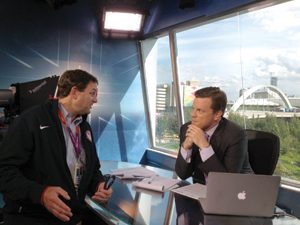Comcast CEO Brian Roberts was standing at a crowded party at the Battersea Power Station in southwest London last Monday night, making small talk with a cable operator executive who was attending the Olympics as a client of NBC, which Comcast bought last year.
 |
NBC Sports Chairman Mark Lazarus (left) chats with on-air host Willie Geist.
Photo by: JOHN OURAND / STAFF
|
NBC Universal threw the party for a group of high-level clients, like the NFL’s Steve Bornstein and the PGA Tour’s Tim Finchem, who attended the first few days of the Olympics as guests of the network. Most of the group was leaving the next day, and NBC’s top brass was bidding them goodbye.
The company’s CEO, Steve Burke, worked the room, as did NBC Sports Chairman Mark Lazarus. Longtime Comcast executives Jeff Shell and Matt Bond, both of whom are now in key posts at NBC, also played hosts for the first of four waves of clients NBC is bringing over to the Games.
Surveying the room, one thing was clearly evident. It’s a “new” NBC that is running the Olympics. One filled with longtime Comcast executives who are now managing one of the top global events as rights holders for the first time.
They represent a changing of the guard in Olympic media.
Longtime NBC executives, like Executive Producer Jim Bell, Coordinating Producer Molly Solomon and head of production Bucky Gunts, still control the pictures and tell the stories that came across TV screens, and are the continuing vestiges of previous leadership.
But it’s now legacy Comcast executives running NBC’s Olympic business, along with Lazarus and Gary Zenkel, NBC Sports’ president of operations and strategy, that includes so much more than just television. There’s broadband, mobile and video-on-demand to consider, as well.
For at least the first week of the London Games, the Comcast-NBC marriage worked as well as they could expect.
“When we went over to Lausanne [in June 2011], our company made a big bet on the Olympics,” Burke said. “We can breathe a little easier now that we’ve seen the early ratings. The ratings help me feel confident that we’re going to see a return on that investment as we continue to produce the Olympic Games.”
Television ratings for NBC’s prime-time block were, by far, the early story of the Games and exceeded the most optimistic expectations. NBC averaged 35.6 million viewers through the event’s first five nights, putting the London Games on pace to become the most-watched Olympics in history.
But perhaps even more surprising were the business metrics around the Olympics. NBC sold more than $1 billion in ad sales — $1.02 billion to be exact — and started releasing new ad inventory into the market. During Comcast’s quarterly earnings call last week, Roberts said his company expects to break even on these Games — an about-face from a month ago when executives warned they were likely to lose money. The next day, Lazarus suggested the company may even make money on the event.
“This has been a great beginning and it is all we could ever wish for in so many categories … the open ceremonies, ratings, live streaming, great content on so many networks,” Roberts said.
New leadership, new style
The “great beginning” that Roberts referenced was felt throughout NBC’s massive compound inside the International Broadcasting Center last week. Network executives clearly were energized from the early ratings reports, and the opening weekend’s TV numbers were among the first topics brought up by NBC Sports executives during a series of interviews last Monday.
The strong ratings seemed to validate Comcast’s strategy to stream every event live, even events the broadcast network held back for its network in years past.
The executive overseeing the implementation of that strategy is the unassuming and well-liked Lazarus, who took over for Dick Ebersol last spring.
Working his first Olympics as the head of NBC Sports, Lazarus’ presence was noticeably different than his predecessor’s. Ebersol was known for bunkering down in the International Broadcast Center, keeping a laser-like focus on the prime-time show. Lazarus makes a point to get out of the IBC, visit NBC’s various sets and chat with everyone from big-name talent to anonymous staffers.
Lazarus, of course, has a different role. He’s not the executive producer, like Ebersol. Lazarus oversees all parts of NBC’s sports business.
 |
Unlike predecessor Ebersol, Lazarus is leaving the International Broadcast Center to visit NBC’s various sets.
Photo by: JOHN OURAND / STAFF
|
While in London, his mornings began in production meetings led by Bell. His days were peppered with ad sales meetings set up by Seth Winter, NBC Sports’ executive vice president of sales and marketing. He regularly met with rights holders, which in London meant International Olympic Committee President Jacques Rogge and member Richard Carrión.
And he has to deal with various brush fires that flare up.
Take last Monday, for example. NBC was the brunt of a torrent of criticism after Twitter suspended a reporter with the British newspaper The Independent. The reporter tweeted Zenkel’s corporate email address, and Zenkel was receiving hundreds of messages.
Before heading out to a dinner with Rogge, Lazarus was spotted huddling with Zenkel and NBC Sports communications staff in the network’s PR office at the IBC, trying to develop strategy for dealing with the controversy.
Twitter eventually restored the reporter’s account and apologized for taking it down.
That wasn’t the only flashpoint for the day. Even though it posted TV ratings that put the London Games in position to become the most watched Olympics in history, NBC received heavy criticism on social networks over its decision to tape delay some of the more popular events. In addition, NBC also was hearing complaints that its online streams were buffering and freezing too much.
A big part of Lazarus’ job was to see if the complaints were valid.
The prime-time ratings told him that the tape-delayed programming wasn’t a problem. And data from Google showing normal failure rates indicated that the streaming issues were not widespread.
“Every frame of every event that’s taking place at these Games is being streamed and available,” Lazarus said. “I think it’s a technological feat that’s never been tackled.”
The early criticism did not weigh down NBC executives last week, and it was clear that Lazarus set the tone for the company by staying positive and not becoming distracted by what he calls “noise.”
He chatted with Burke in NBC’s commissary, a massive cafeteria in the IBC for NBC’s 2,800 staffers in London that has its own 24-hour Starbucks. Burke and Lazarus spoke about NBC’s prime-time show from the night before, when American gymnast Jordyn Wieber broke down crying after failing to secure a place in the individual all-around finals.
Burke hadn’t seen it — but it was the type of emotional Olympic moment for which NBC is known. Burke held up a DVD of the telecast and said he planned to watch it later.
The online streaming complaints never came up in their conversation.
About two hours later, Lazarus rode a golf cart into Olympic Park to visit NBC Sports Network’s studio, which is on the park, adjacent to the Athletes Village.
While there, he casually bantered with one of the on-air hosts, Willie Geist. Both Geist and Lazarus attended Vanderbilt, and they relished last season’s basketball wins against Kentucky.
The positive energy was palpable, as tape-delay complaints were never mentioned.
The mood in NBC’s IBC offices was as upbeat as you could expect for a group that’s working on five hours sleep a night. (Lazarus, for example, is spending the Olympics going to bed after NBC’s prime-time programming ends, around 5 a.m., and wakes up at 9:30 a.m.).
The unexpectedly big TV ratings and the number of online streams helped keep the group energized and focused through the Olympics’ grueling first week.
“I want to be part of as much as I can,” Lazarus said. “I haven’t gone through this before. These first couple of days are a great learning curve for me. I have thought about it, learned about it, talked to everyone in the company about it. But to actually live through it is quite different and educational.”
Different, indeed. The same term could be applied to Comcast-owned NBC during this year’s Games.
Staff writer Tripp Mickle contributed to this story.





